Past Events
The Centre has played host to multiple events over the years. On this page, you can explore the breadth of topics, issues and modalities that we have engaged with in an effort to further the rigour of cultural research here in the university and more broadly in Singapore.
19 JUN 2024
"Intelligent Communication and City Networks" A Hybrid Preconference of the International Communication Association
Co-hosted by the Cultural Research Centre (National University of Singapore), the Center for Information and Communication Studies (Fudan University), and, the Center for Digital Communication Studies (Zhejiang University)
Abstract:
Intelligent communication re-wires various networks of cities, provides possible alternatives to intelligent mediation in urban settings, and renews an understanding of digital cities. Facilitated by increasingly intelligent technologies, such as ChatGPT, mobile VR, or TikTok, emerging networks of migration, trade and cultural exchanges re-connect cities into new clusters or communities. Examining the tension that intelligent communication brings to these networks carries important implications for the future of people, resources and technology. At this preconference, interdisciplinary scholars will share research focusing on theorisation, historiography, research methodology, and media practices.
Registration page: here.
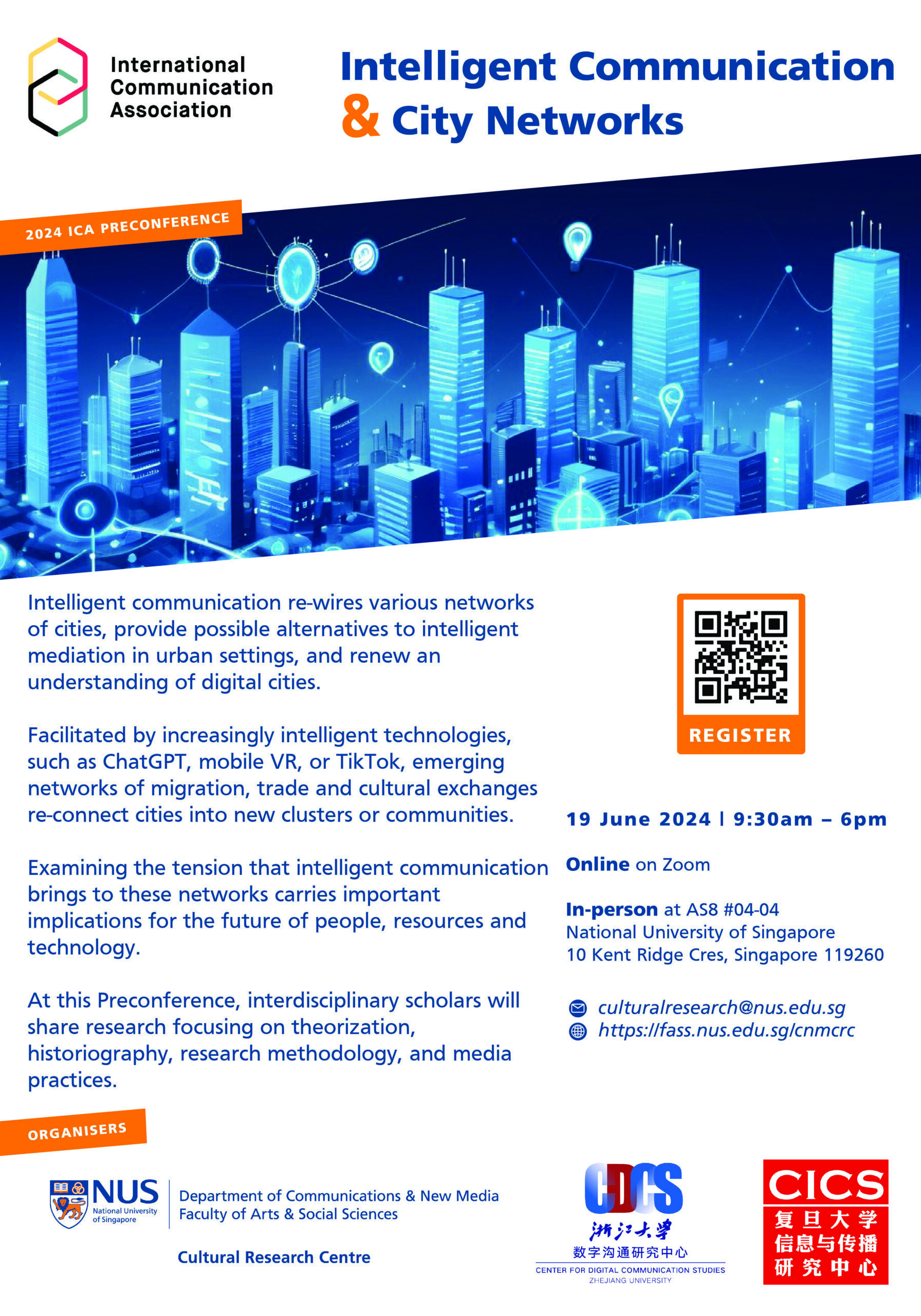
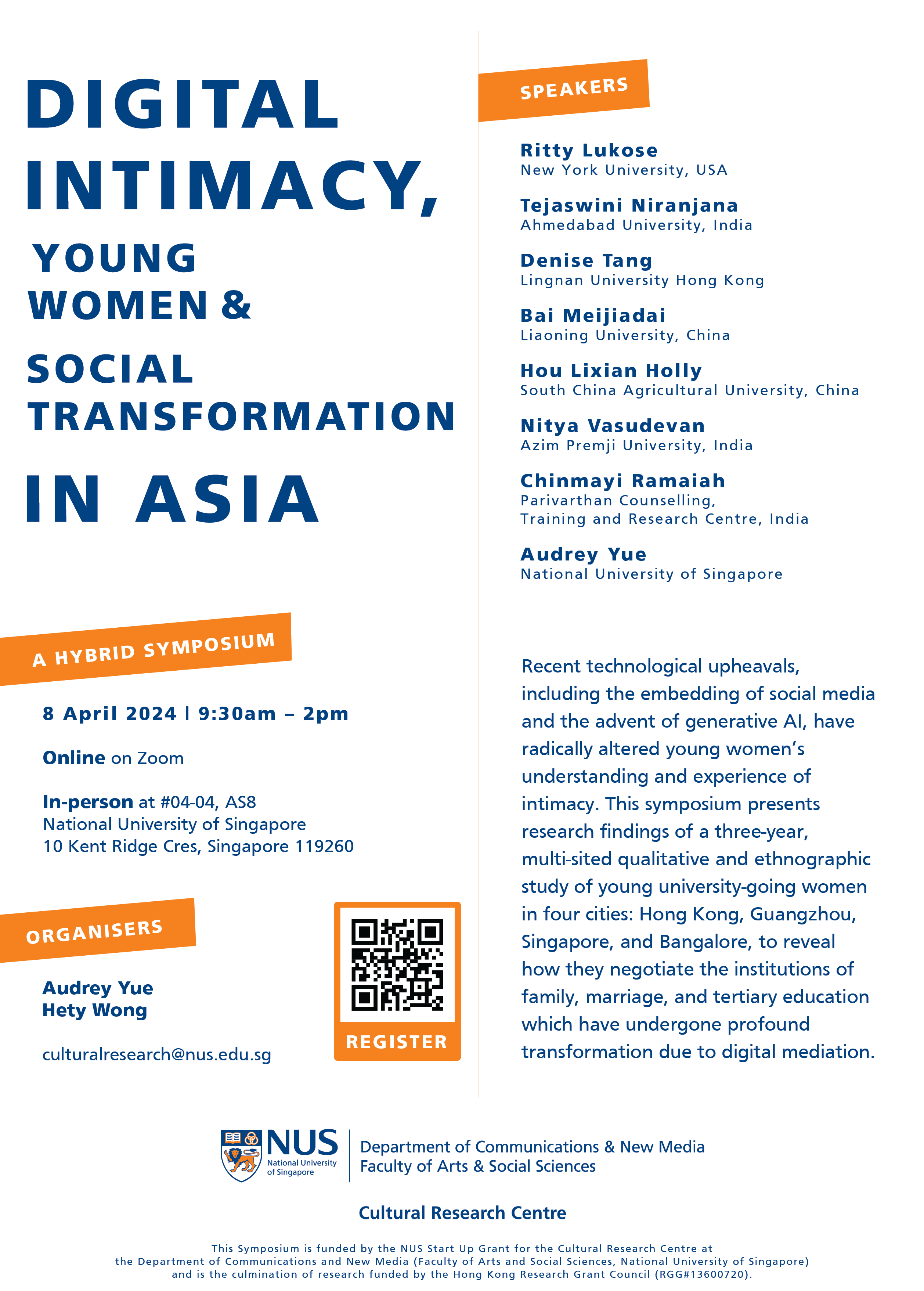
8 APR 2024
“Digital Intimacy, Young Women and Social Transformation in Asia” Symposium
By the Cultural Research Centre
Abstract:
Recent technological upheavals, including the embedding of social media and the advent of generative AI, have radically altered young women’s understanding and experience of intimacy. This symposium presented research findings of a three-year, multi-sited qualitative and ethnographic study of young university-going women in four cities: Hong Kong, Guangzhou, Singapore, and Bangalore, to reveal how they negotiate the institutions of family, marriage, and tertiary education which have undergone profound transformation due to digital mediation.
The Symposium delightedly included the following speakers (in alphabetical order):
Dr Bai Meijiadai, Liaoning University, China
Dr Hou Lixian Holly, South China Agricultural University, China
A/P Ritty A. Lukose, New York University, USA
Prof Tejaswini Niranjana, Ahmedabad University, India
Ms Chinmayi Ramaiah, Parivarthan Counselling, Training and Research Centre, India
A/P Tang Denise Tse Shang, Lingnan University, Hong Kong SAR China
A/P Nitya Vasudevan, Azim Premji University, India
Prof Audrey Yue, National University of Singapore, Singapore
Registration page: here.
29-30 NOV 2023
Foundations for Home-Based Work
By Asia Research Institute
Abstract:
Along with the rest of the world, Singapore’s COVID-19 circuit breaker response required many to work-from-home, transforming conventional boundaries between work and home. Suddenly, societies world-wide were confronted with unforeseen challenges and unexpected silver linings of home-based work (HBW). Yet, the pandemic is only a catalyst for this phenomenon, as HBW has been around far beyond it, be it through traditional cottage industries and piecework, or telework spurred by the increased adoption of technology over the last few decades. In Singapore, HBW presents specific challenges particular to the high-density, high-rise environment that accounts for the majority of housing. Our city planning makes clear demarcations between spaces designed and zoned for work and those designed and zoned for living, where houses and housing estates have always been designed for unpaid home life, and not paid work.
What, then, makes the home and neighbourhood operable for various forms of home-based work, be it teleworking, home-based businesses, or freelancing? How do home-based workers adapt to the demands of today’s labour market? How does a resident furnish, use and service their home and their routines to shape the domestic environment for labour? What kind of amenities, environments, or communities near the home are needed to support their work life?
Foundation for Home-Based Work: A Singapore Study (NUS-IRB-2021-799) is an interdisciplinary project funded by NUS SSRTG, seeking to address these unanswered questions and to understand how home-based work is built into homes and neighbourhoods. The interdisciplinary team, comprising researchers from the National University of Singapore’s Department of Architecture, Department of Communications and New Media, and Yale-NUS College, meets this gap with an approach that bridges between the social sciences and design thinking.
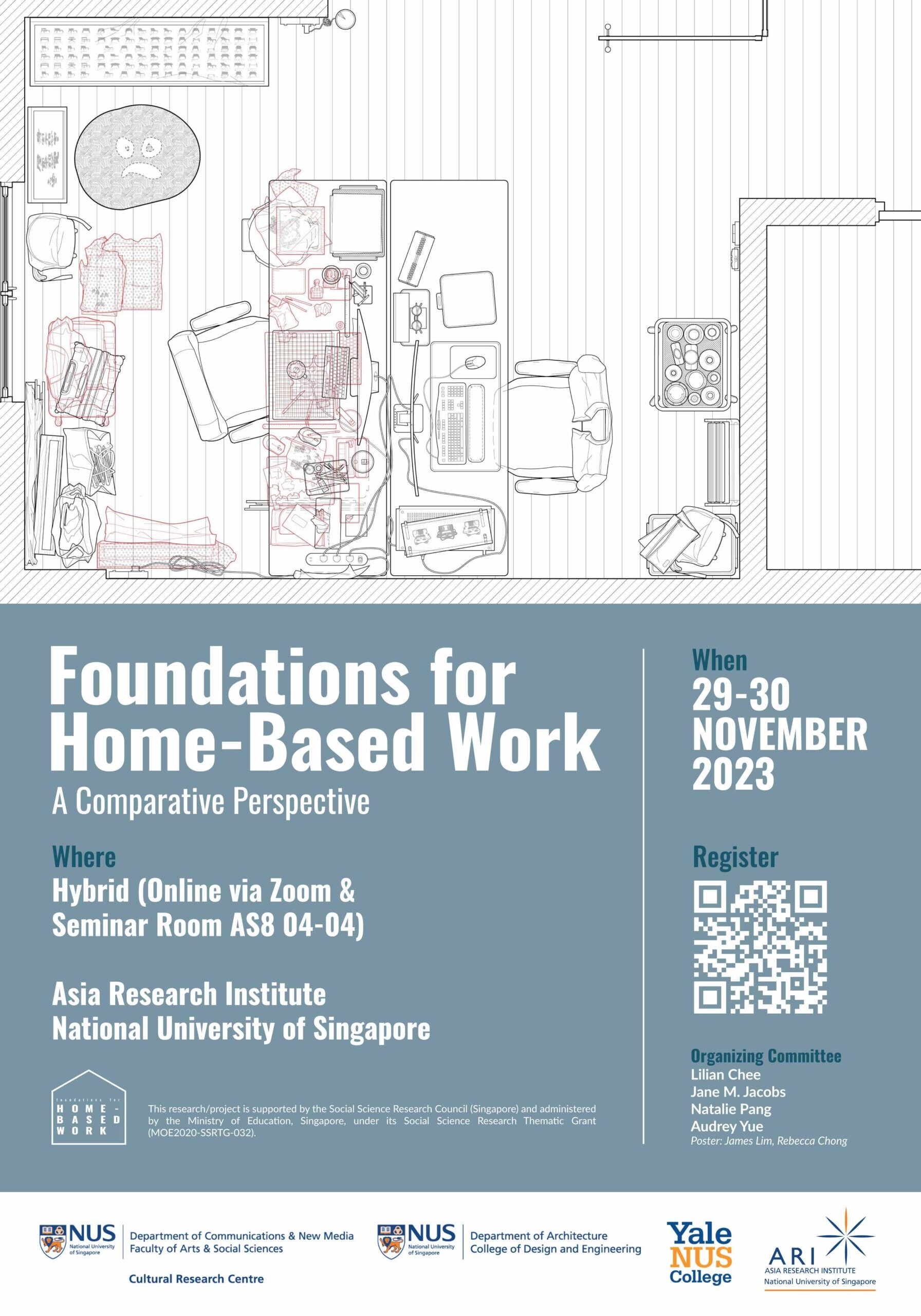

26-30 JUL 2021
"Culture in the Pandemic Age" The Bi-annual Inter-Asia Cultural Studies Society International Conference
Co-hosted with the Inter-Asia Cultural Studies Society at the National University of Singapore, Singapore
Abstract:
In July 2021, the Inter-Asia Cultural Studies Society (IACSS) Conference, organised by the Inter-Asia Cultural Studies Society (IACSS) and the NUS Cultural Research Centre, held a first-ever virtual conference that live-streamed keynotes and plenaries by distinguished scholars and practitioners regionally and internationally. The conference comprised three segments:
26 July – Graduate Conference: 1 keynote, 2 plenaries
27 July – Cultural Studies in Singapore Conference: 1 welcome address & opening roundtable, 2 plenaries
28-30 July – Main IACSS Conference: 1 keynote, 7 plenaries, General Assembly
Total: 14 live-streamed keynotes and plenaries and a general assembly
11-18 nov 2020
The Communicative City in the Pandemic Age
Workshop in conjunction with the Communicative City Research Network
Abstract:
Globally, almost 60 percent of the world’s population lives in cities, just when a global health crisis is forcing much of that population stay at home as a sanctuary and means of maintaining the contagion. This has resulted in the reconsideration of the urban landscape as a place to live and work. In the midst of the COVID-19 outbreak the Internet has become the means of both transmission and connection within often mandatory seclusion. The communicative city is being redefined. Data and connectivity accompany isolation. Densely populated cities are ground zero for the coronavirus’ spread, cases and highest fatalities. The global pandemic has hit urban areas particularly hard with population density an inherent part of the problem. Domestic space has taken on new functions as access to public spaces are restricted. Traditional sites of community and interpersonal interaction such as stadia, arenas, convention centers, theaters, clubs, performing arts centers, universities, schools and restaurants have been closed, depicted as dangerous environments. Data and connectivity are redefining the nature of work and place as the suburbs and rural locations again replace the city as a sanctuary, a more desired place to live and work.
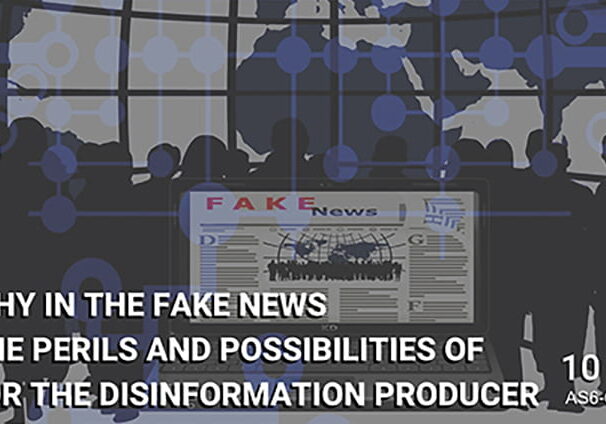
10 Dec 2019
Ethnography in the Fake News Factory
Presentation by A/P Jonathan Ong (UMass-Amherst)
Abstract:
What can production studies and the cultural studies of creative industries contribute to current debates in political communication and disinformation studies? What are the political tradeoffs to consider when we record the voices of fake news authors and position them as complicit workers rather than exceptional villains? This talk presents conceptual and methodological reflections from a three-year study of the political trolling industry in the Philippines with recent comparative research in Thailand. I argue that ethnographies of disinformation production open possibilities for the reparative critique of political marketing and influencer industries and local-level / bottom-up engagements with tech platforms.
04 Oct 2019
The Confluence between Cultural and Communication Studies
Presentation by Prof Toby Miller
Abstract:
Communications is a much bigger field than cultural studies. Each one is split, both by geography and discipline. I'll explain how they differ across various sites, both intellectually and politically. Communication studies is divided between a tradition of textual analysis, specifically debate, rhetoric, hermeneutics, and forensics; versus an effects tradition, looking at violence, education, consumption, and citizenship. At its strongest, cultural studies borrows from these and other influences, through its use of political economy, textual analysis, and ethnography. Those approaches are themselves inflected with queer theory, feminism, postcolonial studies, and environmental work, inter alia. I favour an ambitious new programme for cultural studies that can also influence communications. This entails a turn beyond the centring of consciousness and towards materialist work focused on the environment and the labour process.
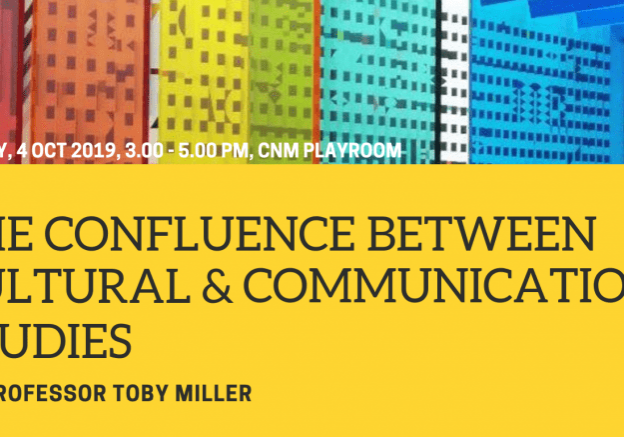
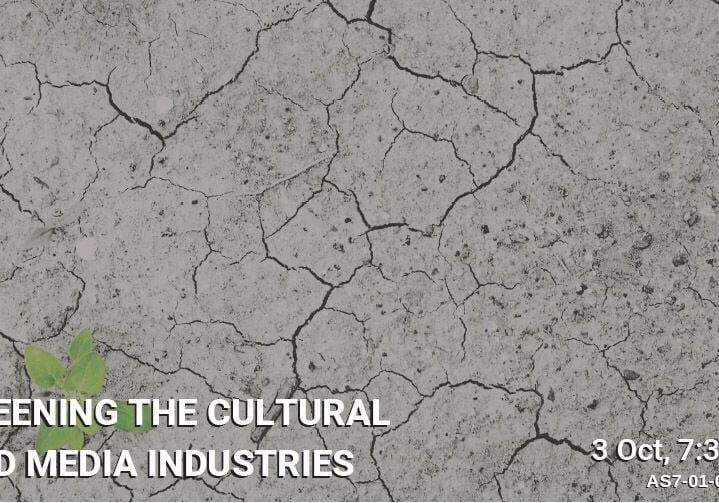
03 OCT 2019
Greening the Cultural and Media Industries
Presentation by Prof Toby Miller
Abstract:
Today’s cultural and media industries are green, aren’t they? Their residues are code, rather than carbon—and they do not contribute to climate change. Hence their adoption by the latterday idea of creative industries, which has been accepted so fulsomely from Chile to China. The idea is that a new, post-coal economy can emerge, turning rustbelt cities in the US into heritage trails and manufacturing labour in China into consumers. Creative cities will purportedly be full of same-sex couples, PhDs, and smart phones: the metrication of the creative industries values such signs as measures of tolerance, talent, and technology. But is this true?
The prevailing discourse on these industries misses out crucial facts. For culture and media generate massive pollution, serious occupational health-and-safety issues, and an exploitative labour process. These problems are all too material, and reminiscent of precisely the extractive and manufacturing sectors they are supposedly ready to displace.
This talk will endeavour to illustrate that history and offer an alternative future, one that can be cleaner, greener, and fairer.
04 Oct 2019
Film Screening + Q&A: A Land Imagined
Film Screening with ExxonMobil Campus Concerts
About the film:
Set in industrial Singapore, police investigator Lok must find missing migrant worker Wang. Wang suffers a worksite accident and is afraid of repatriation. Unable to sleep, he frequents a dreamy cybercafé in the dead of the night. Hoping to look for some form of human connection in this foreign land, Wang forms a virtual friendship with a mysterious gamer that takes a sinister turn. When Wang suddenly disappears, Lok digs deep into the trail leading to a land reclamation site and uncovers the truth beneath all that sand.
A Land Imagined《幻土》 exposes a side of Singapore that is not commonly known or understood even to Singaporeans, grappling with issues of ethics and identity, and gives audiences a glimpse into the lives of migrant workers, the difficulties they face as well as their hopes and dreams. Touching on the notion of the ‘other’, the film highlights themes of heritage and society, showing migrant workers who are essential to the continual progress of our nation but yet are excluded from our society.
This noir film has won numerous awards, including being the first Singaporean film to win the Golden Leopard prize at the 71st Locarno Film Festival (Switzerland) 2018, as well as the Best Film in the Asian Feature Film Competition at the 29th Singapore International Film Festival – SGIFF 2018.
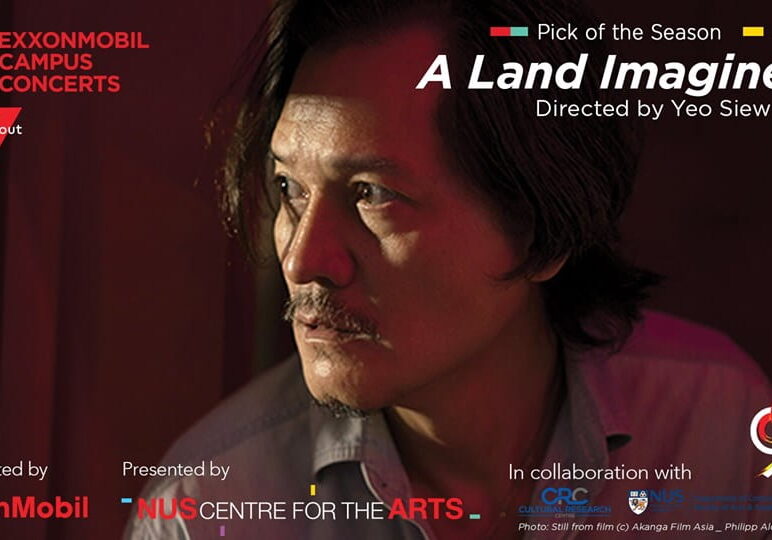
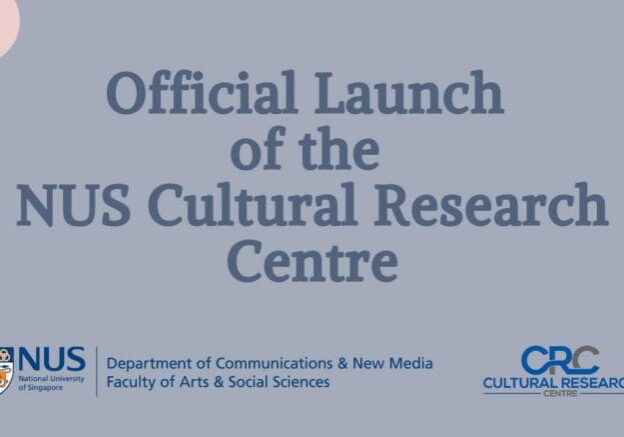
03 OCT 2019
Official Launch of the Cultural Research Centre
Based within the Department of Communications and New Media and the Cultural Studies in Asia Programme at the National University of Singapore, the key objective of the CRC is to promote, incubate and advance multi- and cross-disciplinary cultural research that is engaged and grounded in Singapore as well as Asia.
The launch included an overview of some of the aims and plans of the Centre, as well as a panel that critically discussed and deliberated the meaning, significance and challenges of conducting cultural research. The panel featured cultural researchers and practitioners including Chen Kuan-Hsing, Chua Beng Huat, Felicia Low, and Imran bin Tajudeen.
08 Jul 2019
From Floating Life to Open Homes: Exploring Cultural Exchange between Asia and Australia
Conversation with Asialink and Asia-Europe Foundation
About the discussion:
ASEAN-Australia connections have been high on the political agenda in the recent years. Political, security, trade, education and development links have been formalised and growing.
But where do cultural relations and co-operation between Asia and Australia stand? What are some past and present modes and forms of cultural exchanges and collaborations, particularly from the context of Singapore? What roles do the arts and culture play in enabling meaningful dialogue and fostering mutual understanding? What sectors are better connected and where are the weak links? What role do public agencies play in promoting closer cultural ties? What are some best practices and pitfalls that arts and cultural practitioners should be aware of?
Join us for a stimulating conversation with professional and academic experts from the field, about the possibilities of cultural exchange between Asia and Australia, particularly in a globalised world where borders are increasingly fluid, but yet also progressively polarised.
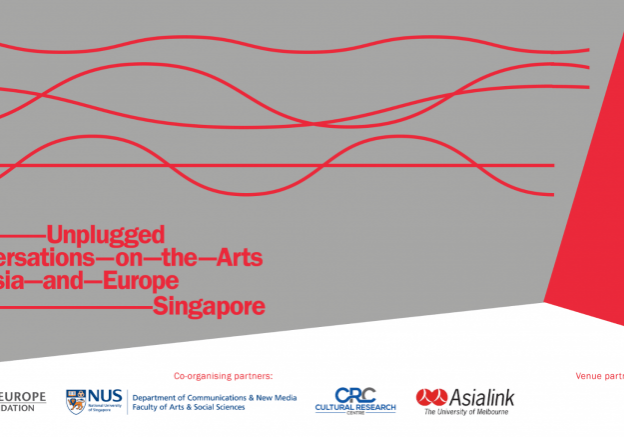
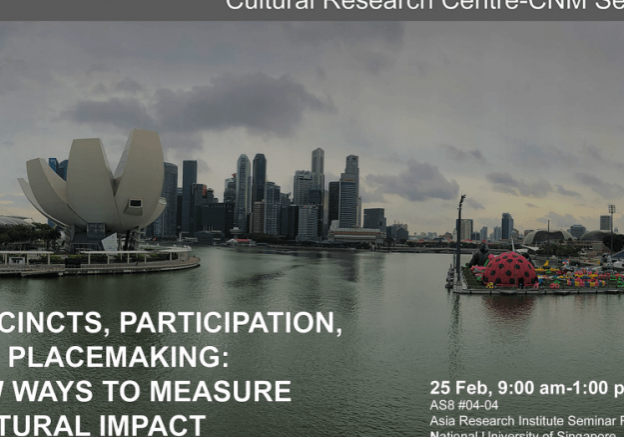
25 Feb 2019
Precincts, Participation, and Placemaking: New Ways to Measure Cultural Impact
Seminar with the following speakers:
- Prof. Audrey Yue, Director of Cultural Research Centre and Head of the Department of Communications and New Media, National University of Singapore
- Prof. Andy Pratt, Professor of Cultural Economy of City, University of London
- Prof. Jane Jacobs, Professor of Urban Studies, Yale-NUS College on From Spaces to Places: Exploring the Cultural Dimensions of Precincts
- A/P Chang Jiat-Hwee, Associate Professor at the Department of Architecture, National University of Singapore on Patterns and Pedagogies of Placemaking
- Asst. Prof. Hoe Su Fern, Assistant Professor of Arts and Culture Management and Arts & Culture Management Coordinator at the Singapore Management University on The (trans)Formations of Architectural and Urban Environments: Notes from Two Histories of the Present
- A/P Bige Tuncer, Associate Professor of Architecture and Sustainable Design at Singapore University of Technology and Design on Beyond Spectacular Display: The Redistributive Potentials of Placemaking in Singapore
- A/P Lilian Chee, Professor at the Department of Architecture, National University of Singapore on Placemaking with the Support of Multi Modal Information and Visualisation
- Ludovica Tomarchio, PhD Candidate at the Singapore University of Technology and Design on Architecture Inside Out: Intersections with Art and Film
- Dr. Sharon Chang, Senior Deputy Director (Research) at the Ministry of Culture, Community and Youth, Singapore on Exploring Shifts in Art Production and Consumption in Cities through Social Media
Placemaking is a central policy theme for arts and cultural programming all over the world, including Singapore. Precincts such as the Civic District, Bayfront, and Bras Basah.Bugis have together seen billion-dollar redevelopment and refurbishment efforts, resulting in new artistic styles and increased cultural participation. But there is no sustained study on how their cultural impacts have supported place-based belonging and identities. This public seminar by the Cultural Research Centre brought together a multi-disciplinary team of experts to discuss new methods (quantitative, qualitative and computational) for evaluating the cultural impacts of placemaking and participation.
22 FEB 2019
Gender and the Media in Contemporary Japan: Continuity and Change
Seminar by A/P Hiromi Takana, School of Information and Communication, Meiji University
About the seminar:
Research about gender and the media constitutes an important part of a scholarship of media and communication as well as gender studies. It emerged about half a century ago, initially as ‘women and media’ studies. Since then, many empirical studies have been conducted and a number of concepts and theories have been developed. This lecture, organised by the Cultural Research Centre, introduced this exciting research area with a focus on contemporary Japan. After an overview of the research so far, the lecture presents the current situation related to digital media and identifies old and new gender issues therein.
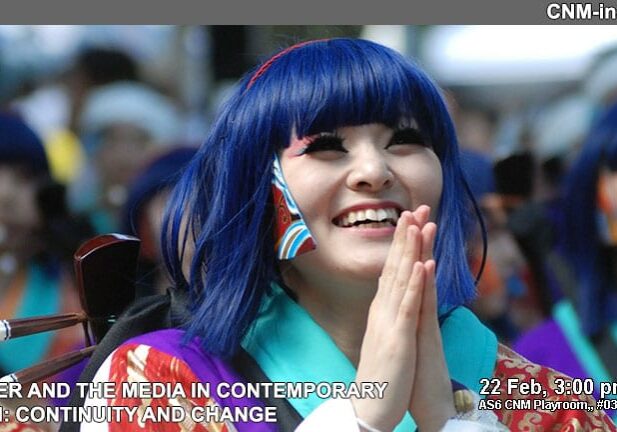
25 jan 2019
Queer Cinema in Neoliberal Times: Strange Bedpartners
Seminar by Prof Chris Berry, Professor of Film Studies, King’s College London
Abstract:
We usually think of queer and neoliberalism in opposition to each other. After all, it was the inaction of US President Ronald Reagan on the HIV/AIDS crisis that inspired the establishment of Act-Up and Queer Nation. However, this talk argues that analysis of LGBTQ films such as A Fantastic Woman, The Kids Are Alright, and 120 BPM reveals a more ambivalent and complex relationship. If queer is all about abandoning identity for Butler’s performative model of flexible identity, neoliberalism also embraces flexibility as the key to success in an era of aspirationalism. Could it not be said that trans is the ultimate example of flexible aspirationalism? Or is an insistence on being trans no matter what the cost the very opposite of neoliberal flexibility? And why, in films like 120 BPM, do we see the rise of queer nostalgia for the worst of pre-neoliberal times – the HIV/AIDS crisis era?
12 OCT 2018
Digital Citizenship in Asia
Seminar with the following speakers:
- Prof Audrey Yue, National University of Singapore
- Dr Elmie Nekmat, National University of Singapore
- Prof John N. Erni, Hong Kong Baptist University
- Dr Natalie Pang, National University of Singapore
- Assoc Prof Fran Martin, University of Melbourne
- Mr Cleve Arguelles, University of the Philippines Manila
- Assoc Prof Tracey Skelton, National University of Singapore
- Dr Annisa R. Beta, National University of Singapore
- Assoc Prof Weiyu Zhang, National University of Singapore
About the seminar:
In the past two decades, the study of digital citizenship has emerged as an important site of study in the field of communications and new media. Studies on the concept has developed from focusing on normative ideas on citizenship to a more multidimensional, non-linear understanding (Coleman, 2006; Choi, 2016), seen as ‘a fluid interface’ remaking the idea of citizenship (Vivienne, McCosker, Johns, 2016). Youth, in particular has emerged as key players. However, research on youth and digital citizenship tended to focus on youth living in developed Western countries with more ‘stable’ democratic and civic engagements. The Digital Citizenship in Asia Seminar aimed to work out how youth in Asian societies are actively participating and engaging in digital citizenship. The speakers presented their research on youth and their forms of engagement with digital citizenship in China, Hong Kong, Indonesia, Singapore, and the Philippines.
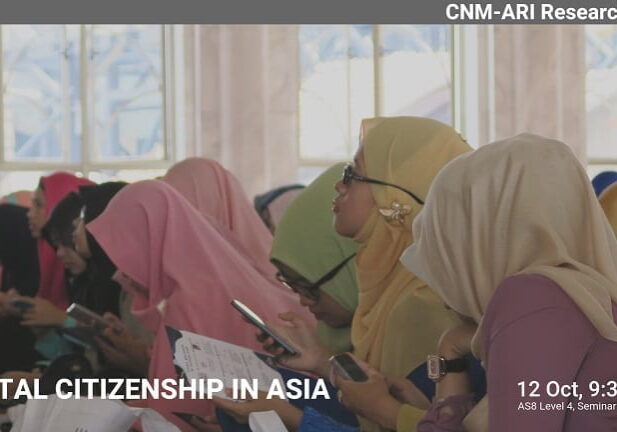
14 SEP 2018
Who Still Needs Cultural Research?
Lecture by Prof. John Nyuget Erni, Hong Kong Baptist University
Abstract:
In this lecture, I revisit the important threads of research innovation in Communication that has been enabled by Cultural Studies. In following Ien Ang’s provocation when she asked “Who Needs Cultural Research?” in 2005, I will trace the ways in which questions of “cultural intelligence” and “cultural impact” of media are vital today more than ever, especially around the post-ideological forms of inquiry in popular culture studies and the social movement implications of communicative practices at large.


